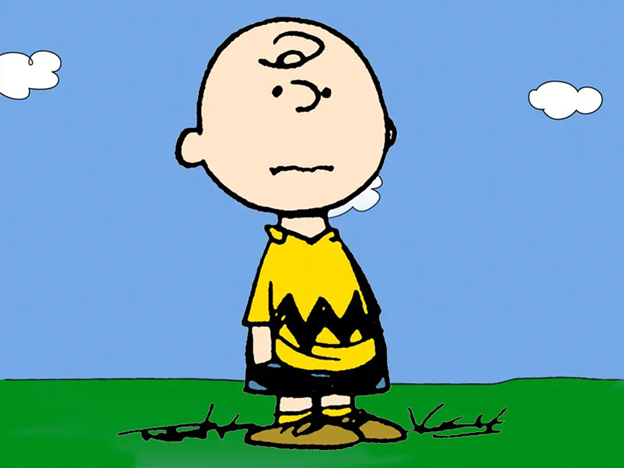
Throughout July we’re taking an in-depth look at Proverbs, the Bible’s one-of-a-kind book about our never-ending need for wisdom.
Charles M. Schulz never hid the fact that his most famous cartoon creation was really a depiction of himself.
Charlie Brown is a boy with a big ego (as represented by his huge head) who experiences life as incurably disappointing and confusing.
Schulz’s life, like Charlie’s, was marked by a low grade fever of sadness. “I don’t think I’m going to be happy,” he told his wife. And that was on their honeymoon. Argh.
A year before his death in 2000 he told an interviewer: “I would love to be un-anxious, [but] I don’t know how to go about doing it… I have this awful feeling of impending doom.” He told another writer that on most days, “I wake up to a funeral atmosphere.” Good grief.
When A Charlie Brown Christmas won an Emmy for best TV feature in 1965, Schulz was genuinely shocked to hear his name called. His acceptance speech was famously brief: “Charlie Brown isn’t used to winning. So, we thank you.”
Before Peanuts debuted in 1950, America’s comic artists had typically focused on one-panel gags and broad jokes.
Schulz’s cast of characters, which featured a collection of children and a highly precocious beagle (and a notable absence of grown-ups) was different. They experienced life primarily in four-panel mini-dramas – 17,897 altogether over a period of nearly 50 years. They wrestled with friendship, hope, sadness, God, the meaning of existence, and life’s toughest problems.
What’s significant is that they never really resolved any of them.
Without even trying to do so, Schulz became the world’s first philosopher cartoonist.
It’s ironic that someone who searched so long and hard (and unsuccessfully) for happiness succeeded in sparking so much happiness in others. In 1963 Schulz released history’s first free-standing compilation of comic strips, a volume that tried to fill in the blank: “Happiness is…” It was the “phrase-launcher of the times,” according to author David Michealis in Schulz and Peanuts.
The book proclaimed that “happiness is a warm puppy.” High-minded critics scoffed. “Happiness isn’t a warm puppy!” scowled Sir William Hawthorne of Cambridge, who was quite convinced that Truth could not be found in a comic strip.
Schulz struck back, not without a little anger: “I will defend to my dying day the statement that happiness is a warm puppy. I defy the critic to give me a better definition of what happiness is. It may take him a 12-volume set of books to do it, but in one sentence let him try to tell me better what is more happy than a little kid putting his arms around a warm puppy. If that isn’t happiness, I don’t what is.”
So what is the definition of happiness?
Maybe it’s hidden in plain sight.
Happiness comes from the same root that gives us the word “happen.” Happiness depends on what is happening, or not happening, at a given moment. Happiness may come down to something as simple as whether or not you feel like a blockhead, whether someone snatched the football away just when you were about to kick it, or whether there is a warm puppy on your lap. Or whether that puppy seems intent on ruining your carpets.
Proverbs, like most of the books that make up the Old and New Testaments, acknowledges that the vast majority of the world’s citizens, on any given day, are searching for happiness. But God offers something fundamentally different. And profoundly better. God offers the gift of being blessed.
Blessing is the God-provided certainty that all is well – an assurance that is strangely and wonderfully independent of happiness.
For instance, you can be happy but not blessed. That may seem like an acceptable way to live. But such happiness is notoriously fragile – a condition that, once lost, can only be recovered by the next vacation, the next financial windfall, or the next drink. Maybe.
On the other hand, you can be blessed but not happy. Perhaps the feeling of happiness simply eludes you right now. But if you know that you are blessed – if you know that God favors you with his presence, his grace, and his unchanging love – then nothing can rob you of something even better than happiness. That would be joy. And it just so happens that the joy of being blessed is what human hearts hunger for more than anything else.
Proverbs 10:22 qualifies as one of the Bible’s most underrated verses. It’s profound but overlooked. Here’s how it reads in three different English renderings:
“It is the Lord’s blessing that makes you wealthy. Hard work can make you no richer” (Good News Translation). “The Lord’s blessing is our greatest wealth. All our work adds nothing to it!” (The Living Bible). “God’s blessing makes life rich; nothing we do can improve on God” (The Message).
Will meeting the love of your life make you happy? Yes. But only for a while. Will winning the Lottery make all your dreams come true? No. Maybe a few of your fantasies. But your deepest dreams – the ones that God planted – will almost certainly recede farther from your reach.
Happiness is…knowing in our heart of hearts that by abandoning ourselves to God we are genuinely blessed.
No matter what happens.
